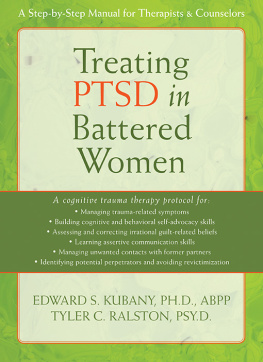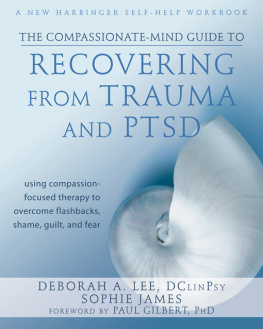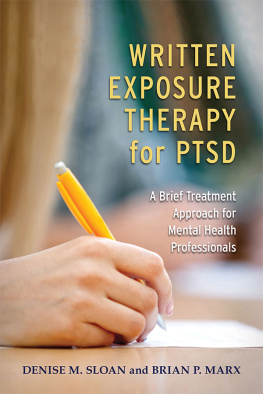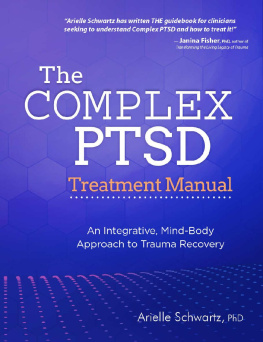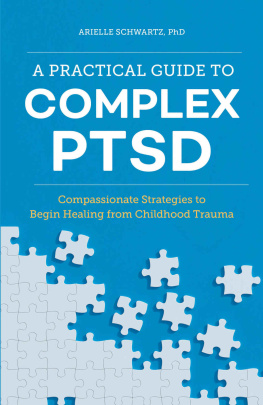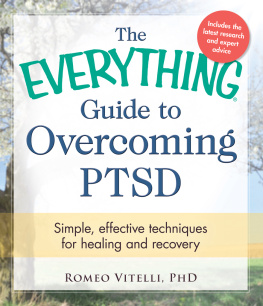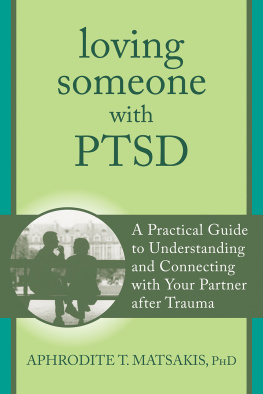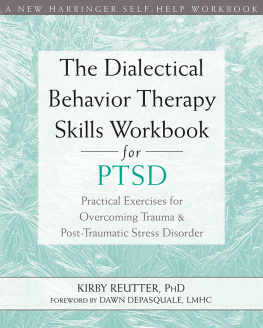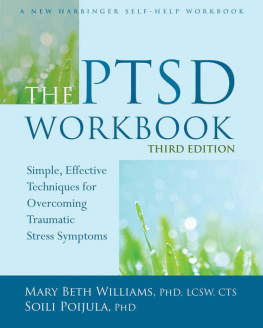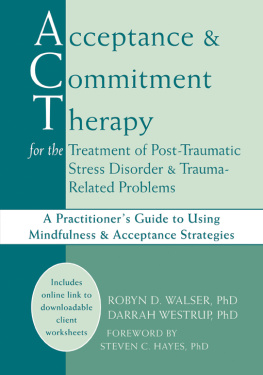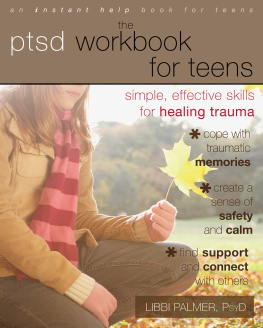Edward S. Kubany, Ph.D., was employed for fourteen years as a research clinical psychologist with the Department of Veterans Affairs, National Center for PTSD, in Honolulu, Hawaii. Since 1990, he has specialized in the assessment and treatment of PTSD in his research and clinical practice. Kubany has more than twenty-five peer-reviewed publications, was principle investigator or co-principal investigator on four federal grants, and is first author of a self-help book for battered women, Healing the Trauma of Domestic Violence.
Tyler C. Ralston, Psy.D., served a post-doctoral fellowship at the Department of Veterans Affairs National Center for PTSD in Honolulu, Hawaii. In his clinical practice, he specializes in the treatment of PTSD and trauma-related guilt, working with formerly battered women, combat veterans, and other trauma survivors.
For more information, please visit www.treatingptsd.com.

Kubany and Ralston have developed a systematic approach to the treatment of PTSD in battered women that is firmly grounded in empirically-supported principles of cognitive behavioral therapy. This approach is tested in research and comprehensively described in this clear, session-by-session procedural guide, which is complete with client handouts and homework forms. This manual is a crucial resource for anyone treating women traumatized by intimate-partner violence and abuse.
Josef I. Ruzek, Ph.D., acting director of the Education Division of the National Center for PTSD located in the Veterans Administration Palo Alto Health Care System in Menlo Park, CA
Finally, a manual that describes a highly effective cognitive-behavioral treatment for PTSD in formerly battered womenboasting a 90 percent recovery ratewith such detail that even helpers with no prior psychotherapy training have used it successfully. Experienced therapists treating PTSD in any population will also find this volume of value for its brilliant integration and sequencing of interventions that prepare real world clients for success with the difficult but essential exposure components of PTSD treatment. Highly recommended for every clinician who treats trauma, and essential reading for therapists who treat battered women.
Irene G. Powch, Ph.D., psychologist on the PTSD Clinical Team at the Portland Veterans Administration Medical Center, and faculty in the Division of Psychology, Department of Psychiatry at Oregon Health and Science University
At last! A book that addresses the unique struggles of battered women in their battle to reclaim their dignity and personal power. Kubany and Ralston have done a masterful job applying the proven principles of cognitive behavioral therapy to the specific issues that plague abused women. This concise, well organized guide is a must-read for anyone in the field of domestic violence.
Aphrodite Matsakis, Ph.D., practicing psychologist with more than thirty years of experience working with trauma survivors, including abused women, and author of twelve books on trauma-related subjects
Kubany and Ralston have produced a superb clinical guide that clearly describes and richly illustrates their state-of-the-art, empirically supported cognitive-behavioral treatment of PTSD in formerly battered women. The book offers a masterful synthesis of science and clinical wisdom that guides therapists through the complexities of treating PTSD in survivors of domestic violence. The volume is essential reading for anyone who works with survivors of spousal abuse.
Steven Taylor, Ph.D., ABPP, professor of psychiatry in the Faculty of Medicine at the University of British Columbia, and author of Clinicians Guide to PTSD: A Cognitive-Behavioral Approach
Written by clinical scientists, this volume is an excellent resource for clinicians from all disciplines who are interested in learning specific strategies for addressing problems associated with surviving domestic violence. In addition to providing specific guidelines for treating PTSD symptoms, the authors deal with related problems, including mistrust of others and managing contact with abusers. The chapters on guilt and negative self-talk present best-practice procedures for psychological interventions with these clinical problems, which are commonly associated with surviving a battering relationship. The authors include data on the efficacy of this approach, providing yet another reason to consider this volume as an outstanding source of information on treatment in this area. Guidelines for modules provide objectives for sessions, homework assignments, and handouts that can be photocopied for clients. While the treatment of battered women has been of clinical interest for many years, this text is one of the first to present treatment strategies based on empirical findings. This important text will definitely be an asset to practitioners who are new to this area, as well as experienced providers in the field.
Victoria M. Follette, Ph.D., chair of psychology and professor of clinical psychology at the University of Nevada, Reno, and clinical scientist specializing in the treatment of trauma in women

Publishers Note
This publication is designed to provide accurate and authoritative information in regard to the subject matter covered. It is sold with the understanding that the publisher is not engaged in rendering psychological, financial, legal, or other professional services. If expert assistance or counseling is needed, the services of a competent professional should be sought.
Distributed in Canada by Raincoast Books
Copyright 2008 by Edward S. Kubany and Tyler C. Ralston
New Harbinger Publications, Inc.
5674 Shattuck Avenue
Oakland, CA 94609
www.newharbinger.com
No Longer A Worthless Person by Helen Altonn, originally published on September 6, 1999, is reprinted with permission of the Honolulu Star-Bulletin.
Abused Women to Share in New Therapy Project by Helen Altonn, originally published on September 6, 1999, is reprinted with permission of the Honolulu Star-Bulletin.
New Hope for Battered Women by Seabrook Mow, originally published on August 9, 2000, is reprinted with permission of MidWeek.
Attitudes About Guilt Survey on page [181] and Thinking Errors That Contribute to Guilt on page [191] from Kubany, E. S., & Manke, F. P. (1995). Cognitive therapy for trauma-related guilt: Conceptual bases and treatment outlines. Cognitive and Behavioral Practice, 2, 27-61. Reprinted with permission.
Negative Self-Talk Monitoring Form on page [56] from Kubany, E. S., & Watson, S. B. (2002). Cognitive trauma therapy for formerly battered women with PTSD (CTT-BW): Conceptual bases and treatment outlines. Cognitive and Behavioral Practice, 9, 111-127. Reprinted with permission.
Final paragraph of relaxation script text on page [78] from Knox, D. (1971). Marriage happiness. Champaign, IL: Research Press. Reprinted with permission.
Clinicians may freely copy and use the handouts in this book in their own practice, but all other rights are reserved.
Acquired by Catharine Sutker; Cover design by Amy Shoup;
Edited by Jasmine Star; Text design by Tracy Carlson
Epub ISBN: 978-1-60882-647-6
---------------------------------------
The Library of Congress has cataloged the print edition as:
Kubany, Edward S.
Treating PTSD in battered women : a step-by-step manual for therapists and counselors / Edward S. Kubany and Tyler C. Ralston.
Next page
